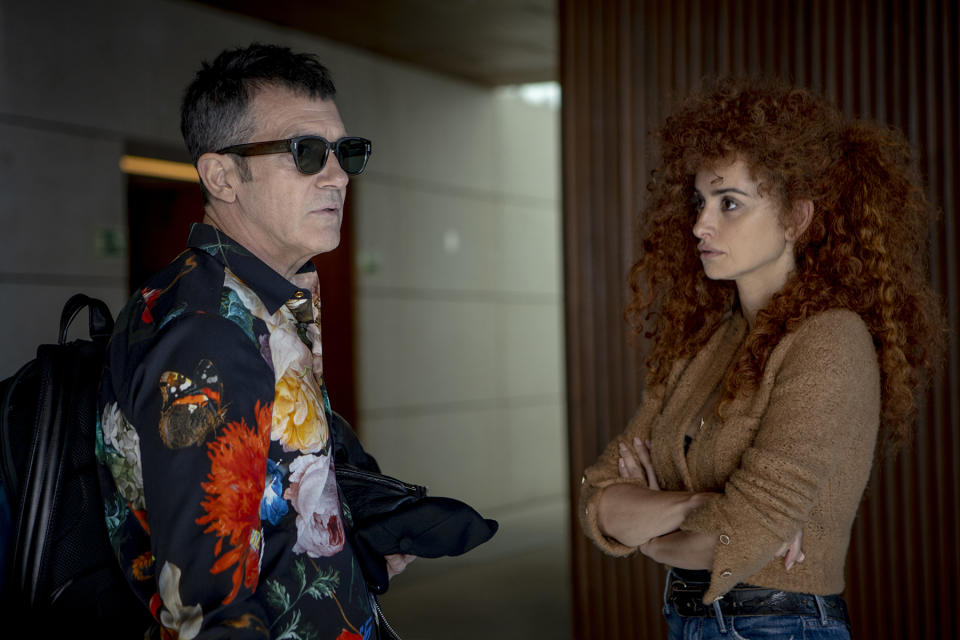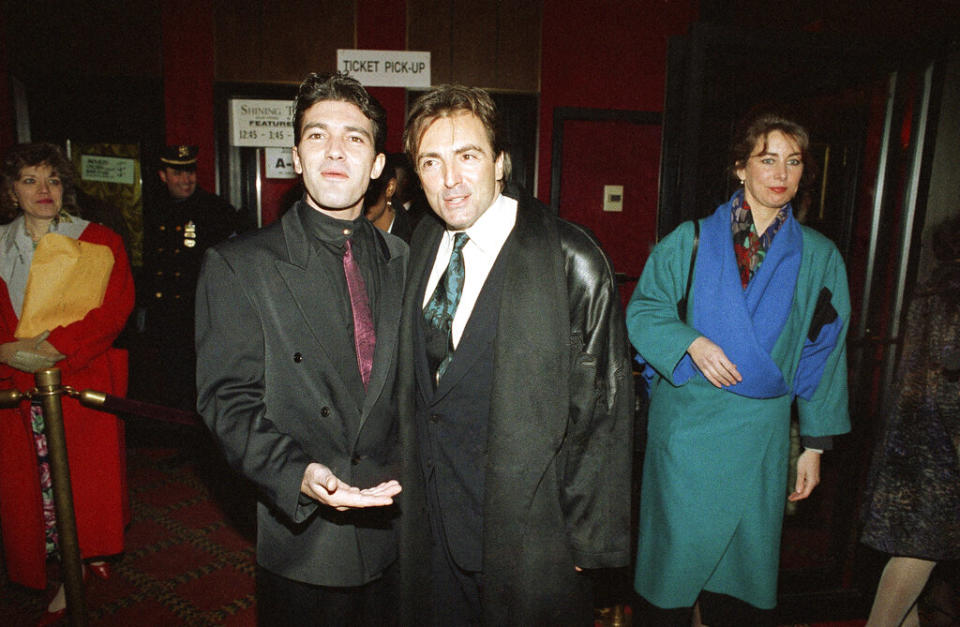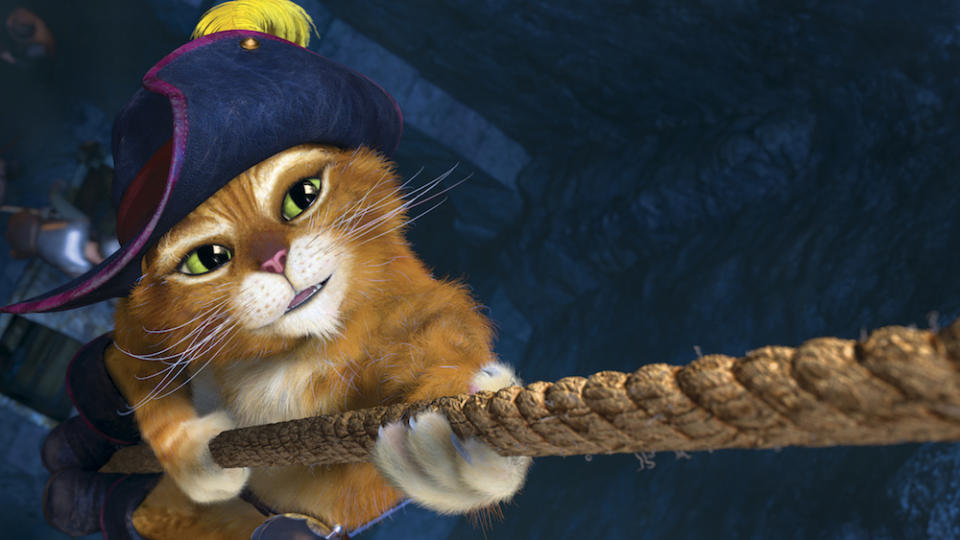Antonio Banderas Looks Back on Adjusting to Hollywood as an Outsider: ‘I Couldn’t Express Myself’

- Oops!Something went wrong.Please try again later.
In 2019’s “Pain and Glory,” Antonio Banderas landed an Oscar nomination for playing a downtrodden artist contemplating the end of his career. Soon after that movie’s successful run, Banderas could relate. When COVID shutdowns threatened the future of his Malaga-based theater Teatro Soho CaixaBank the next year, Banderas’ new career chapter as an artistic director in his homeland was in doubt.
Two years later, however, the 61-year-old actor is busier than ever and brimming with enthusiasm about his future. In the Spanish-language “Official Competition,” which IFC Films opens in the U.S. this week, he plays a pompous movie star drawn into a project directed by an exacting filmmaker (Penelope Cruz) after an aging billionaire (José Luis Gomez) decides to finance a movie on a whim. The satirical comedy premiered on the fall circuit last year, just a few months before Banderas surfaced as the villain in the box office hit “Uncharted.”
More from IndieWire
Jerrod Carmichael Explains Why He Spent His Whole Life Preparing to Make 'Rothaniel'
'Leo Grande' Helped Emma Thompson Accept Who She Is: 'I've Judged Myself All My Life'
And that’s not all. Banderas acted in those movies just before reopening his theater with a new Spanish-language production of “Company,” which came on the heels of the well-received “A Chorus Line” production that opened the theater. He’s now planning to open an off-shoot of the theater in Madrid with another staging of “Company” this fall after finishing his promotional duties for “Official Competition.” In the midst of overseeing that show and starring in it night after night, Banderas continued to perform a wide array of projects, from the upcoming animated sequel “Puss in Boots: The Last Wish” to the upcoming “Indiana Jones 5.” Suddenly, he’s everywhere.
Such versatility might suggest that Banderas is on a quest to reignite his global movie stardom, but the actor insisted that his priority was with his theater. Three decades after he first arrived in Hollywood, Banderas sat down with IndieWire to discuss the recently-wrapped “Company” production, how he managed to squeeze in projects alongside each other, and reflect on the challenges he faced as a Spanish speaker in the studio system all those years ago.
This interview has been edited and condensed for clarity.
IndieWire: How did the challenge of “Company” differ from “A Chorus Line”?
Antonio Banderas: It was better. It wasn’t not harder physically, but intellectually. We had to deal with the death of our creator, Mr. Sondheim, who died in the third week of performances for us. We had been the last production before he died. In my mind, I’ve wanted to do “Company” for a long time.
I asked permission from Mr. Sondheim through his people to elevate the age of the main character, who I play. They were sending us emails and saying that there was no problem with that. The only thing they forbid me from was doing anything with the production that has been done before, which I didn’t want to do. I wanted to create my own version.
How did you do that?
The whole entire show starts with clocks. You see a transparent screen but you don’t know it’s transparent at the beginning. I film my actors and they start appearing on stage. People think they’re the real actors, but then they realize that they’re not. They are behind the screen. Bobby [the protagonist, played by Banderas] is there and he’s remembering things, putting them together to contemplate the possibility of dying. It’s almost like he’s reuniting with all his friends for this celebration. I kept the actors on the stage the whole time. I had a rotating stage of three different rooms. It just allows me to create very cinematic stuff. There is a subway in the pit of the orchestra. The whole theater is New York surrounding you. The action on the stage is very simple. We are furniture.
You had planned to bring “A Chorus Line” to New York —
And then the COVID came.
What about this one?
This one, I don’t know. I don’t know if, after “Company” was here in English, anyone will be interested in seeing our play. The thing is… [sighs] The problem with COVID was that I had made the decision to bring “A Chorus Line” here in Spanish in 2020. We would’ve been the first Spanish-speaking company to hit Broadway — and in a major way, because we were going to stay for a minimum of six months. But then what happened with COVID was that I had an accumulation of work: Movies, plays I had the rights to do. Everything became so compact and my agent said to me, “You cannot go for six months to Broadway. We have these things we have to do.” It became more complicated.

Manolo Pavon, exclusive to IndieWire
“Official Competition” is very cynical about the film industry: A rich guy makes a movie just because. Have you ever felt like you have taken on a project just for the money?
Not yet.
Really? After all these years?
No, and I think in a way, I am going away from that. My theater company is a non-profit that allows me to do things I couldn’t do in a for-profit situation. For example, “Company” had 26 musicians. Even when Sondheim’s people came, they couldn’t believe it. Every sound was made in the theater. We brought all of these people to Malaga and gave them the possibility to play everyday. If I had been trying to make money on it, I would’ve been using probably seven musicians. In the way that I am doing things, if something is written as a harp, it has to be a harp.
So even your recent role as the villain in “Uncharted” wasn’t a paycheck gig?
With that specifically, no. The director [Ruben Fleischer] approached me and he knew my career. He convinced me that it was a worthy thing to do. By the way, I haven’t seen it. Now I think it’s on Apple in Spain so I might buy it there. But it was a pleasure working with him. We were in the middle of the pandemic. One month before I had gotten sick with COVID. Then I tested positive on the set but it was just a false positive. The thing was still in my body. So they just sent me to the hotel for a bit.
I gather you were just happy to be back on set.
Yes. But it’s true that I have done movies that allow me to have enough funds to do theater, things like that.
It’s been 30 years since your first English-language role in “The Mambo Kings,” and you didn’t speak English then. You learned how to pronounce your lines phonetically.
Thirty years? Really? Wow.

ASSOCIATED PRESS
How hard was it for you at that time to be a Spanish-speaking actor in Hollywood?
I never felt like I was suffering as a foreigner, but the language was obviously a tremendous handicap. At least I could learn the lines and go perform. But my normal everyday life became very complicated. I would get invited to meet with other actors who I admired, to visit their homes. I would feel incapacities because I couldn’t express myself.
Which actors are we talking about here?
People like Sharon Stone, who I did a commercial with. I would say, “Fuck, she might think I’m stupid.” There was Tom Hanks, too, when I did a movie with him [“Philadelphia”]. I couldn’t express myself to them in the way I do in Spanish. It was all very shallow. There was no complexity and depth to what I wanted to say. For years I felt that frustration.
It was not until I met Melanie [Griffith, whom Banderas married in 1996 and divorced in 2015] that I felt kind of protected. She could talk to me about the universe in which I stepped, knowing perfectly well what she was talking about. Her mother was an actor. She was Hollywood royalty in a way. So you know through that person how that works. For me, everything was very professional in a place where I didn’t know how anything was supposed to work.
As you learned English, did you ever feel pressured to lose your Spanish accent to get more roles?
That was always going to be impossible. When you learn a language at the age of 31, the problem is that you will always sound different. It doesn’t disappear. I told this story to Bill Clinton one night. He asked me what I attracted me about America so much. I had directed this movie “Crazy Alabama,” and he said, “You seem to know a lot about us.” And I started talking about the vision I had of America. I remember in 1972, I was a kid, watching the Olympic games opening ceremony. Here comes Sweden, Kenya, Korea, and then America. And they had people from everywhere, every ethnicity. I found that so beautiful. I thought this is a project: America has a unified people in a very specific way.
That’s a rather idealistic point of view.
Yes, it has all these problems. But at the time, I thought when I started working here that this is probably the only country in the world where you can have a believable person living in America who has any type of accent. It’s just a common thing. Just walk on the streets of New York. You hear all types of accents. Yesterday when I arrived this cop who asked for my autograph was Cuban, and you could feel his accent.

Netflix
Now your voice itself has become almost as recognizable as your face. You just did “Puss in Boots: The Last Wish.” How much are you invested in that franchise?
I was doing “Company” at the same time and doing “Puss in Boots” during the day was not good for singing at night. You are talking like this all the time [lowers his voice to Puss-level guttural growl]. That is really prohibitive if you have to sing. So I was being cautious doing it on my free days. Then one day the studio said, “I don’t think you know what we’re doing here, you’re too busy with ‘Company.’ Can we show you half an hour of the film?” I had the time so I sat down to watch it. It was phenomenal.
What they do is they use the time that we’re in, and how COVID has affected people. When the movie starts, Puss realizes he has only one life left, so everything changes. Now he’s a hero but he’s afraid, he’s paranoid. He starts hyperventilating, panicking, and he starts questioning life and death in a very beautiful way. He has this new friend who’s a Chihuahua with one tooth who admires him. Puss thinks he’s going to die and he’s panting. This little dog comes and puts the head on his tummy very delicately. Puss starts stroking his head and breathing normally. These two characters, without any words, for like a minute — after COVID, it’s so emotional. Oh my god. How did they do that? I heard they did a test screening L.A. and it was going to open in September but after that they decided to go to Christmas. So they believe they have a winner.
How did you squeeze in “Indiana Jones 5”?
I had to stop for nine days of rehearsal on “Company.” I left very specific plans for musical numbers with the choreographer and some other things I didn’t have to be there for. I was shooting the movie in Sicily. Every day I would go home in a hotel and receive an email with the full rehearsal. So I was watching it and taking notes. It was like that. It went well. I don’t know about the film. We’ll see.
You grew up in Spain during the Franco dictatorship, when censorship was rampant. Do you see any parallels with society today?
It’s completely different because the censorship we had in Spain at the time was imposed by the government. The censorship we have now is imposed through channels that didn’t exist at the time. Now you’re afraid to say certain things because you can get whacked on social media. So who is the dictator there?
You tell me.
Nature. Ourselves. We are capable of doing this to ourselves. You know, fear is probably the most viable thing for manipulating people. It’s supported basically by ignorance. That’s why it’s so important to support the arts. When people ask me what we can do to improve the world, I say, tell the people to read, to go to theaters, to see paintings, to read poets, to read Fitzgerald and Hemingway, the thinkers. A country without art and culture is very dangerous.
IFC Films releases “Official Competition” in theaters on Friday, June 17.
Best of IndieWire
New Movies: Release Calendar for June 17, Plus Where to Watch the Latest Films
Tom Cruise's 15 Best Performances, from Maverick to Frank T.J. Mackey
Sign up for Indiewire's Newsletter. For the latest news, follow us on Facebook, Twitter, and Instagram.

